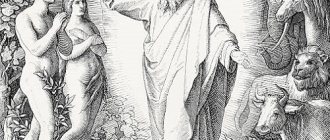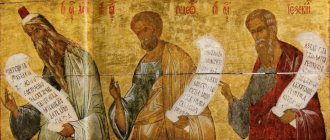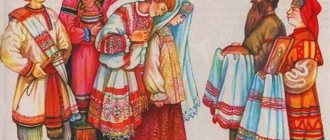Every believer knows that the Bible is sacred Scripture from the New and Old Testaments. The word "Old" confuses many people. The meaning of this word can be deciphered as old and unnecessary. But is the Old Testament “unnecessary”? And are there any differences between the New and Old Testaments? These are the questions that interested me. I found answers to them and want to share them with you.
What does the Old Testament describe?
The first part of Holy Scripture consists of 4 large subchapters. The Old Testament begins with the Pentateuch; in Judaism it is called the Torah. The Pentateuch is dedicated to the Law of Moses. The Pentateuch itself consists of 5 chapters; they describe the events that took place before the world was created. Subsequent books are devoted to the history of the Jewish people. The Testament of the Old Testament includes a section that includes 5 books (Job, Proverbs, Psalms, Ecclesiastes, Song of Songs). The holy book ends with the Scriptures of the prophets.
What does the New Testament describe?
The major events of the New Testament focus on the birth, teachings, and death of Jesus Christ. This part of the Holy Scriptures is entirely devoted to the Christian faith.
The New Testament describes far fewer events than the Old Testament. In terms of volume, this sacred book is significantly smaller than the first.
The New Testament consists of 4 subsections:
- The canonical Gospels, which describe the Nativity, life, teachings, torment, Passion and Resurrection of Jesus.
- Church book. The New Testament section is entirely devoted to church history.
- Epistles of the Apostles. This includes the letters of Peter, John, Paul, Jude, James (21 letters in total).
- Revelation.
Gospel
This term in religious studies refers to a sacred text telling about the birth, life, death or ascension of Christ. Each of the canonical Gospels describes different events related to Jesus. Why are some of the Gospels considered canonical, while others are rejected by the church?
The answer to this question is quite simple: different confessions interpret the same texts differently, and recognition or non-recognition of the same scriptures as canonical depends solely on the individual characteristics of a particular branch of Christianity. Apocrypha that does not fit the church canons cannot become moral guidelines for true Christians, but at the same time, reading them is not strictly prohibited.
Reference. Translated from Greek, the word “Gospel” means “good news.” In the Bible itself, the word “Gospel” is used in precisely this meaning, for example, when Christ, addressing his disciples, calls on them to go throughout the world and spread the news of the coming of the Kingdom of God.
Differences between the Old and New Testaments
If you read the description of the Old and New Testaments, you may be very surprised. The main difference between the Holy Scriptures is in the content. The essence of the Old Testament is that a person must defend himself, respond to insults and defend himself from enemies in all possible ways. The New Testament describes how important it is to love and honor God, that one must not sin, and that one must be able to forgive one’s enemies.
The New Testament indicates that God will help people get rid of evil, enmity and misfortune. Having gone through numerous torments, they will live happily and amicably with other people. But such a “fate” is reserved only for those who are Christians and revere religion.
In the Old Testament there is no concept of the Heavenly Father, who will protect and preserve everyone. In Holy Scripture, God is described as a cruel, jealous and evil being who calls for revenge for the hurt and pain caused. God in the Old Testament calls believers to sacrifice, and in the New Testament such an action is described as a great sin (“thou shalt not kill”).
The difference between the Old and New Testaments is that the sacred Scriptures have completely different meanings. In the Old Testament people are called upon to sacrifice living beings, while in the New Testament they are called upon to protect and forgive.
Cup of Two Testaments
Deacon Vladimir Vasilik, a regular contributor to our magazine, talks about the connection between the two Testaments, their deep unity and the difference between them.
What does the Old Testament mean to us? The word "covenant" (Hebrew "berit") meant "agreement." But the phrase Old Testament has two meanings. Firstly, this is precisely a contract, specifically a contract between God and people. Initially - personal agreements with the ancient patriarchs and righteous people - Noah, Abraham, Isaac and Jacob. God demanded from them faith, devotion only to Him and obedience to His commands. For this, He granted them salvation (as, for example, Noah and his family) and blessing (as, for example, Abraham). This is the personal guidance of God, contained in His commandments, which were transmitted and preserved orally. The sign of the covenant was circumcision.
Then there is a covenant or agreement concluded through Moses at Sinai with the entire people of Israel. It was that God would be the only God of Israel, and Israel would be His people. This agreement is in detailed form and is recorded in writing in the Pentateuch (the first five books of the Old Testament - Genesis, Exodus, Leviticus, Numbers, Deuteronomy; Genesis, however, reflects events before the covenant of Moses). The purpose of the Covenant is to distinguish the people of Israel from among humanity and make them chosen, so that the seeds of true faith can be preserved in them and then spread to all humanity. The Lord Jehovah (Jehovah, or Yahweh) becomes the invisible, spiritual king of the Israeli people, who thus receives a special form of government - theocracy, or government by God. The law implied a special way of life, special, “clean”, so-called kosher, food, and prescribed in detail the ritual of sacrifices and sacred rites.
The second meaning of the phrase “Old Testament” is a collection of sacred books, the first, pre-Christian part of the Bible. There are two canons of the Old Testament - the Protestant, based on the Jewish, and the Orthodox, based on the Alexandrian. The first includes the Pentateuch of Moses (Genesis, Exodus, Leviticus, Numbers, Deuteronomy), historical books - the Book of Joshua, four Books of Kings, two Books of Chronicles (priestly chronicles), two Books of Ezra, the Book of Esther, educational books - Psalms of David, Proverbs Solomon, Ecclesiastes, Song of Songs, Book of Job; great prophets - Isaiah, Jeremiah, Daniel, Ezekiel and twelve small ones - Hosea, Joel, Amos, Jonah, Obadiah, Micah, Nahum, Habakkuk, Haggai, Zephaniah, Zechariah, Malachi. The Orthodox, or Alexandrian, canon also adds to them books that have come down to us only in Greek: the three Books of the Maccabees, the Book of the Wisdom of Solomon, the Book of Judith, the Book of Jesus, son of Sirach. What is the significance of these books and how do they relate to the New Testament?
Let us immediately note that the New Testament cannot be read deeply and correctly without at least a superficial knowledge of the Old Testament. As St. Augustine so wonderfully said, “The Old Testament is hidden in the New. The New is incomprehensible without the Old.” There are 82 references to the Book of Deuteronomy alone in the New Testament. There are many references to the Book of the Prophet Isaiah. The constant refrain of the Gospel of Matthew is that the Scripture may be fulfilled, for example, in the story of the Nativity of Christ: And all this happened, that it might be fulfilled which was spoken by the Lord through the prophet, who says: Behold, the virgin is with child and bears a Son, and they call His name Emmanuel, which means : God is with us (Matthew 1 :22–23). This prophet is Isaiah, who foresaw the birth of Christ from the Virgin (see: Is. 7 , 14). As the holy martyr Justin the Philosopher says, “there were once blessed and righteous people, pleasing to God, who spoke by the Holy Spirit and predicted the future, which is now coming true. They are called prophets. They alone knew and proclaimed the truth to people... they spoke only what they heard and saw when they were filled with the Holy Spirit. Their writings still exist today, and whoever reads them with faith receives much instruction about the beginning and end of things. The very events that have already happened and are now still happening are forced to accept their testimony. Also, for the sake of the miracles that they performed, they deserve faith, because they glorified the Creator of all and proclaimed Christ His Son sent from Him; what the false prophets did not do” (Justin Martyr. Conversation with Tryphon the Jew).
The books of the New Testament are filled with joy because ancient prophecies are being fulfilled, which anticipate all the miracles and deeds of our Lord Jesus Christ - from Christmas to Pentecost, which is also the fulfillment of what the prophet Joel predicted: And it shall come to pass after this that I will pour out my Spirit on all flesh, and your sons and your daughters will prophesy; Your old men will dream dreams, and your young men will see visions. And also on the male and female servants in those days I will pour out My Spirit. And I will show signs in heaven and on earth: blood and fire and pillars of smoke. The sun will turn into darkness and the moon into blood before the great and terrible day of the Lord comes. And it shall come to pass that whoever calls on the name of the Lord will be saved (Joel 2, 28–32).
Understanding the New Testament is unthinkable without the Old Testament books, as well as our church life. Especially without the Psalter, in which, in the words of Blessed Augustine, the Lord Jesus Christ Himself and His Church sing, weep and rejoice. We constantly hear the Psalter during divine services: these are kathismas at Vespers and Matins, and psalms of the hours. Other books of the Old Testament are read at Vespers on the indicated days; these readings are called proverbs. Their reading is especially solemn on Christmas Eve, Epiphany and Holy Saturday, when their number can reach 15.
But what about the Old Testament as the Law?
Often an Orthodox Christian hesitates between two maxims: behold, I am making everything new (Rev. 21 :5) and Do not think that I came to destroy the law or the prophets: I did not come to destroy, but to fulfill (Matt. 5:17 ). And moreover, the Savior says: For truly I say to you, until heaven and earth pass away, not one jot or one tittle will pass from the law until everything is fulfilled (Matthew 5:18 ). But how does Christ fulfill the Law? By deepening and spiritualizing it. If the Law forbade killing, then Christ commands not to be angry: You have heard what was said to the ancients: do not kill; whoever kills will be subject to judgment. But I tell you that everyone who is angry with his brother without cause will be subject to judgment; whoever says to his brother: “raqa” is subject to the Sanhedrin; and whoever says, “You fool,” is subject to fiery hell (Matthew 5 :21–22). If the eighth commandment commands not to commit adultery, then Christ says that anyone who looks at a woman with lust has already committed adultery with her in his heart (Matthew 5:28 ). In other words, if the Law prohibited only external sinful actions, then the Savior goes inside and cuts off the spiritual, psychological roots of sin. Let us note, however, that when speaking about the Law in the Sermon on the Mount, the Savior means primarily the Ten Commandments and does not say a word about ritual or legal regulations. It should be mentioned that even in the Old Testament there was a prophetic tradition according to which a moral law was given at Sinai, not a ritual one. It is present, in particular, in the holy prophet Jeremiah: for I did not speak to your fathers and did not give them a commandment on the day that I brought them out of the land of Egypt about burnt offerings and sacrifices; but he gave them this commandment: “Obey my voice, and I will be your God, and you will be my people, and walk in every way that I command you, that it may go well with you” (Jer. 7 :22-23).
Much was given to Israel by Moses because of the hardness of the hearts of the Israelites, and not because of the goodness of God, therefore the original commandment must be preferred to the subsequent one. When the Pharisees tell Christ that Moses allowed them to divorce, they receive a harsh rebuke: He says to them: Moses, because of your hardness of heart, allowed you to divorce your wives, but at first it was not so; but I say to you: whoever divorces his wife for reasons other than adultery and marries another commits adultery; and he who marries a divorced woman commits adultery (Matt. 19, 8–9).
Let's give another example: the Old Testament law forbade taking interest from one's fellow tribesman, but allowed it to be taken from a pagan. In the New Testament, and then in church law, extortion is prohibited altogether.
So, Christ gives a deeper and more perfect moral law based on grace and love.
The question arises: how to relate to the ritual regulations of the Law - about clean and unclean food, about sacrifices, etc.? They are abolished by Christ. The Apostle Paul in the Epistle to the Hebrews explains that the Old Testament sacrifices were imperfect and could not cleanse the conscience. They had the meaning of a prototype of the best and perfect sacrifice of Christ, which He offered with His blood. She is an image of the present time, in which gifts and sacrifices are offered, which cannot make the offerer perfect in conscience, and which, with food and drink, and various washings and rites [relating] to the flesh, were established only until the time of correction. But Christ, the High Priest of future blessings, having come with a greater and more perfect tabernacle, not made with hands, that is, not of this kind, and not with the blood of goats and calves, but with His own blood, one day entered the sanctuary and acquired eternal redemption. For if the blood of bulls and goats and the ashes of a heifer, through sprinkling, sanctify the defiled, so that the body may be pure, how much more will the Blood of Christ, Who through the Holy Spirit offered Himself spotless to God, cleanse our conscience from dead works, to serve the living and true God! (Heb. 9, 9–14).
Question: Should a Christian observe the regulations related to clean, or kosher, food? The answer is obvious: no. A vision to the Apostle Peter speaks about this: The next day, as they walked and approached the city, Peter, about the sixth hour, went up to the top of the house to pray. And he felt hungry and wanted to eat. While they were preparing, he went into a frenzy and sees the open sky and a certain vessel descending towards it, like a large canvas, tied at the four corners and lowered to the ground; in it were all four-legged creatures of the earth, animals, reptiles and birds of the air. And a voice came to him: Arise, Peter, kill and eat. But Peter said: No, Lord, I have never eaten anything bad or unclean. Then another time a voice came to him: what God has cleansed, do not consider unclean (Acts 10 :9-15). The only food prohibition within the framework of the Apostolic Council of 51 was to abstain from sacrifices to idols, blood, and strangled meat (Acts 15:29 ).
There is also no need for circumcision, since you are in Christ and circumcised with a circumcision made without hands, by putting off the sinful body of the flesh, by the circumcision of Christ; Having been buried with Him in baptism, you were also raised again in Him through faith in the power of God, who raised Him from the dead (Col. 2, 11–12).
A special situation with Saturday. The Church abolished the commandment about Sabbath rest, remembering the words of Christ: My Father works until now, and I work (John 5:17 ). At the same time, Orthodoxy maintains respect for the Sabbath day; it is removed from fasting; even during Great Lent, the Liturgy is celebrated on Saturday. Holy Saturday is especially revered. This is the most blessed Saturday, in which the Only Begotten Son of God rested from his work, looking at death (stichera on the Praise of the Great Saturday for And Now).
The attitude towards the Old Testament and the Law in the Church is like the choice of a wise scribe, who takes out old and new from his treasury and chooses what is useful for salvation and eternal life. Both Testaments are inextricably linked. As St. Ambrose of Milan says, “the cup of wisdom is in your hands. This is a double cup - the Old and New Testaments. Drink them, because in both you drink Christ. Drink Christ, for He is the fountain of life.”
Journal "Orthodoxy and Modernity" No. 28 (44)
Source
Is there any similarity in the scriptures?
Since the general collection of the Old and New Testaments is called the Bible, it means that there are certain similarities between the sacred Scriptures. In what ways are they united?
- Scriptures of the Prophets. Both the Old and New Testaments describe events that foretell what will happen to the world and people in the future.
- References in the New Testament to the Old Testament. The New Testament is a kind of addition to the Old Testament. The scriptures confirm previously described prophecies and events.
Believers are sure that if all the sacred events were described in the Old Testament, the New Testament would not have been written. Thus, the sacred Scriptures are a single whole that is combined into a holy book - the Bible.










